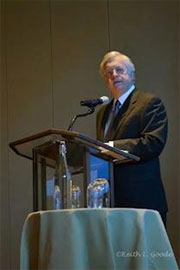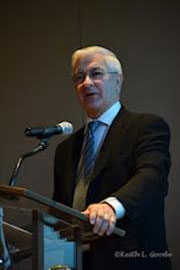Rebuilding Japan
Admiration for the Japanese people continue to push forward in the face of extreme adversity - A seminar to mark the first anniversary of the Great East Japan Earthquake
Houston, U.S.A. March 12, 2012
On February 22, Japan External Trade Organization (JETRO) joined with the Consulate-General of Japan in Houston and the Center for International Business Education and Research at the McCombs School of Business at the University of Texas at Austin to hold "Japan, One Year After – Beyond the Recovery from the 2011 Great East Japan Earthquake". Former U.S. Ambassador to Japan, the Honorable J. Thomas Schieffer and Ray Tanguay, who is Senior Managing Officer for Toyota Motor Corporation (Japan), Senior-Vice-President of Toyota Motor North America and Chairman of Toyota Motor Manufacturing Canada, Inc., gave keynote speeches on the cooperation extended by the United States to Japan for the disaster relief and reconstruction effort and on the strengths of responsibilities incumbent upon Japan's corporations.
The following paragraphs provide an overview of the two keynote speeches.
Strategic Implications of the US-Japan Alliance in a Changing World
by Former US Ambassador to Japan, J. Thomas Schieffer: Re-examining Japan's place in the world
It has been almost a year since the Great East Japan Earthquake, as it is now officially called, devastated a huge swath of the Tohoku region along Japan's northeast coast. My heart continues to ache over the catastrophic loss of life and property sustained by the country, and the sheer scale of this devastating earthquake is far from forgotten. The earthquake gave everyone—not just those in Japan—a better understanding of how globalized the world's economy has become. We have felt the economic impact of the earthquake here in the United States, and the effects of the earthquake, tsunami and the nuclear disaster at Fukushima will continue to be felt for many years to come. We know, however, that the worst is over. I have only the deepest admiration for the strength of character that has been displayed by the Japanese people as they continue to move forward in the face of such enormous adversity. Natural disasters are an inevitable fact of life and the people of Japan offer us an excellent example of how to act when confronted with destructive events of this nature.

The Honorable J. Thomas Schieffer delivers his keynote speech
The US military's Operation Tomodachi relief mission was a huge success and this aid to quake-stricken areas was greatly appreciated by everyone in Japan. US forces stationed in Okinawa were mobilized soon after the earthquake struck as commanders ordered the deployment of as many land, sea and air troops as could be made available to affected areas to support relief operations. Japan has a sophisticated self-defense force but it has yet to acquire the mobility needed to undertake a large-scale emergency operation and it was fortunate that the US military was on hand to provide disaster relief support.
The alliance between the United States and Japan is important, irrespective of which party holds the reins of government in Japan. In the wake of the March 11 earthquake and tsunami, the time has come for Japan to re-examine its position on this relationship given the unprecedented economic, social and political challenges that it currently faces. The rise of China, uncertainty over the volatile Taiwan Strait and the crisis on the Korean Peninsula pose potential threats to Japanese national security. Since the Second World War, the United States has put its national security in Asia in the hands of its strategic alliance with Japan. For more than fifty years, the Japan-US Security Treaty of 1960 has served as the linchpin for US foreign policy in the Asia-Pacific region.
In the four and a half years that have elapsed since June 2007, Japan's premier and foreign minister have changed on numerous occasions. By comparison, Australia's prime minister and foreign minister remained unchanged in the four years that I served as United States ambassador to Australia from 2001 to 2005, and the minister of defense changed just once. The meaningful interaction that emerged through face-to-face discussions, meetings and dialogues conducted during this period paved the way for the establishment of good diplomatic relations between our two nations. In an institutionalized alliance, the support for that relationship should remain impervious to change irrespective of any change in the ruling party. America's response to the diplomatic issues posed by China, the Taiwan Strait and the Korean Peninsula is unthinkable without the Japan-US alliance. We need to draw on that friendship now and resolve to meet the challenges we both face for the mutual benefit of both nations.
Toyota: Positioned for Resurgence
by Senior Managing Officer for Toyota, Ray Tanguay: Toyota will continue to invest in the Tohoku region
I was in Tokyo right up until the day preceding the devastating earthquake that struck on March 11 last year. If I'd delayed my departure by just one day, I too would have been affected by this disaster. I visited Sendai a few days ago and whilst remarkable progress has been made on the repair and reconstruction of collapsed roads and other infrastructure that was damaged in the earthquake and tsunami, other areas remain buried under rubble providing an acute reminder of the sheer enormity of this disaster.
Toyota has a 50-percent share of the auto market in Japan and we believe that we have a responsibility to contribute to the country's recovery and reconstruction. Immediately after the disaster, Toyota executives gathered to discuss what support the corporation could extend not just to their parts suppliers but also to the disaster-stricken areas of Tohoku, and we transported water, food and other daily necessities from Toyota city in Aichi Prefecture to the affected areas. We also dispatched Toyota employees to supplier plants to help ascertain the extent of the damage and figure out ways to resolve the problems.
The disaster exposed the fragility of the supply chain. We were unaware that certain auto paints were only produced at one company in Japan and had not acquired a complete picture of our entire supply chain. The speed of our decision-making process was another element that provided pause for thought. To remedy this problem we decided to introduce a localized decision-making strategy. Our commitment to the just-in-time (lean manufacturing) system is not something we are prepared to compromise on. This approach to production is our trademark.

Toyota's Senior Managing Officer, Ray Tanguay, delivers his keynote address
Toyota has a global risk management team. This team identified two categories of risk with the potential to affect business activities: (1) the cross-border risks associated with procuring mineral resources and parts from areas that have human rights issues, and (2) the country-specific risks that are associated with our future development in China, South Korea and elsewhere. Toyota has no production plants in Korea, but we are planning to incorporate it into our supply chain. The Chinese market remains something of an unknown quantity, but this presents both risks and opportunities. The increased mobility of information that has come through social media constitutes another risk and since information can spread instantly across the globe, fast and accurate information management is essential.
The message from Toyota is that concerted cooperation is the way to overcome adversity. It is a refusal to compromise on the all-encompassing approach to manufacturing that is encapsulated by our monozukuri philosophy or on the values and principles enshrined in the Toyota Way even in the face of difficult circumstances. The concept of monozukuri refers to the contributions to society and prosperity that are made through the manufacture of goods. This philosophy embraces the ongoing commitment to improving our manufacturing excellence and the value we place on the mutual respect for the opinions and capabilities of others that comes through teamwork.
Toyota will continue to invest in the Tohoku region. Some have voiced concerns about the risks posed by radiation and the possibility that another large earthquake could strike the region, but Toyota has production facilities in Tohoku and we have a responsibility to that community. It is our goal to contribute to the revitalization of Tohoku manufacturing by continuing to operate in the region, thereby generating new jobs and supporting the supply chain.



